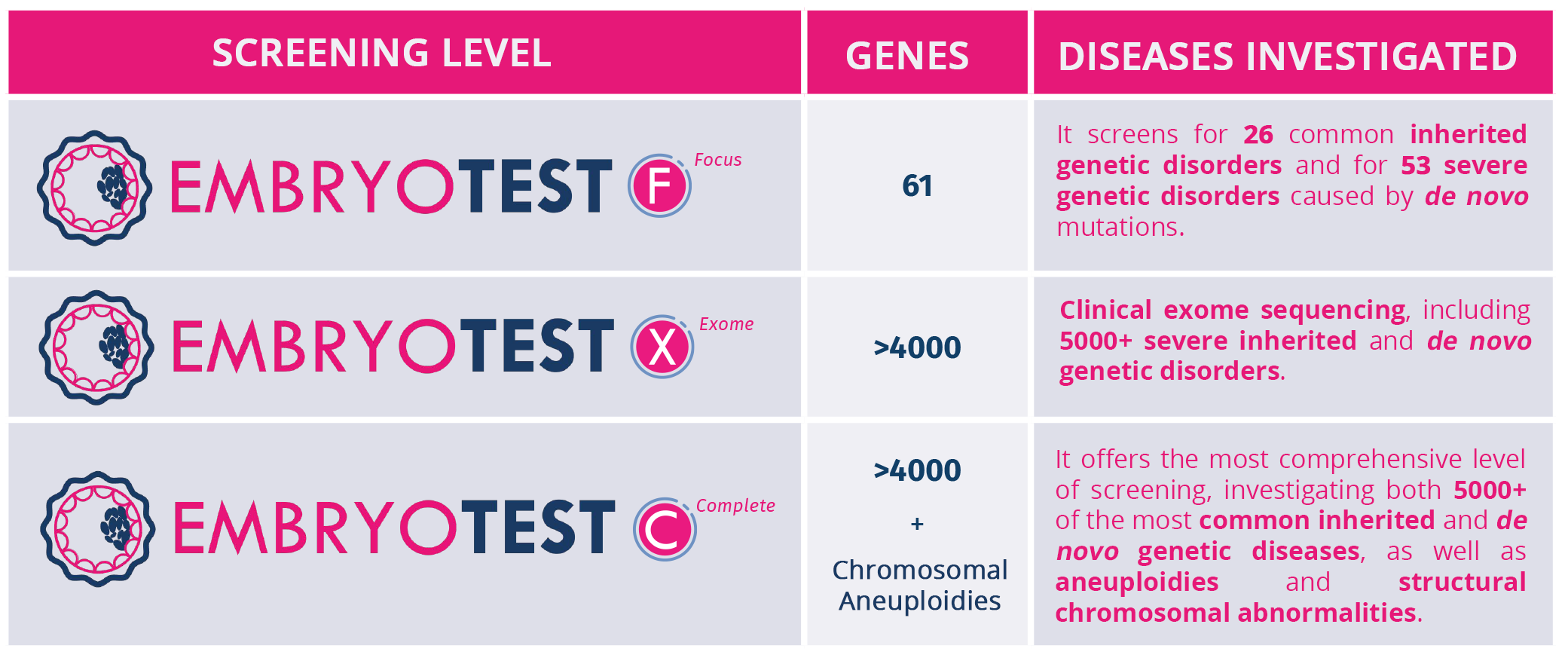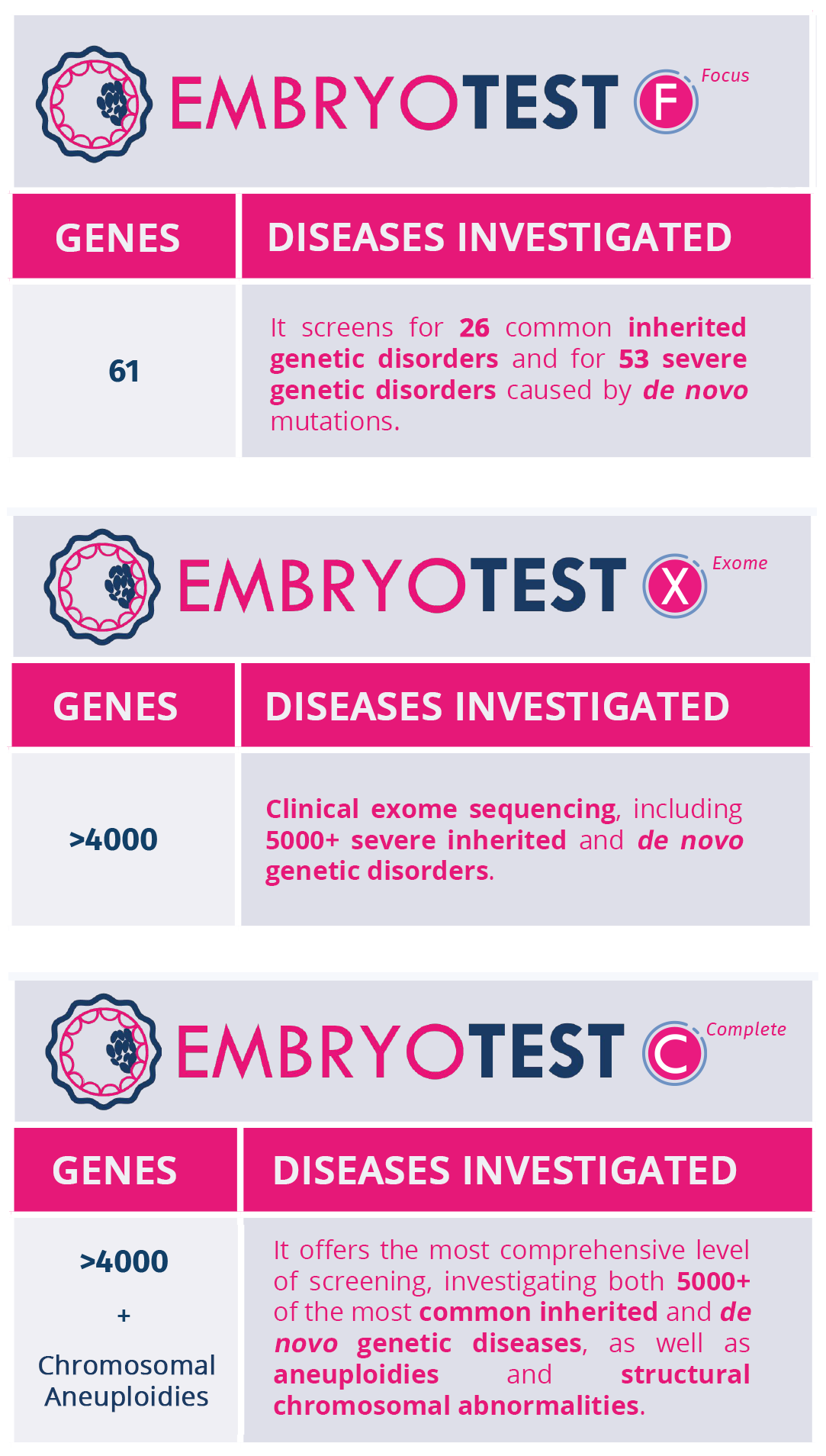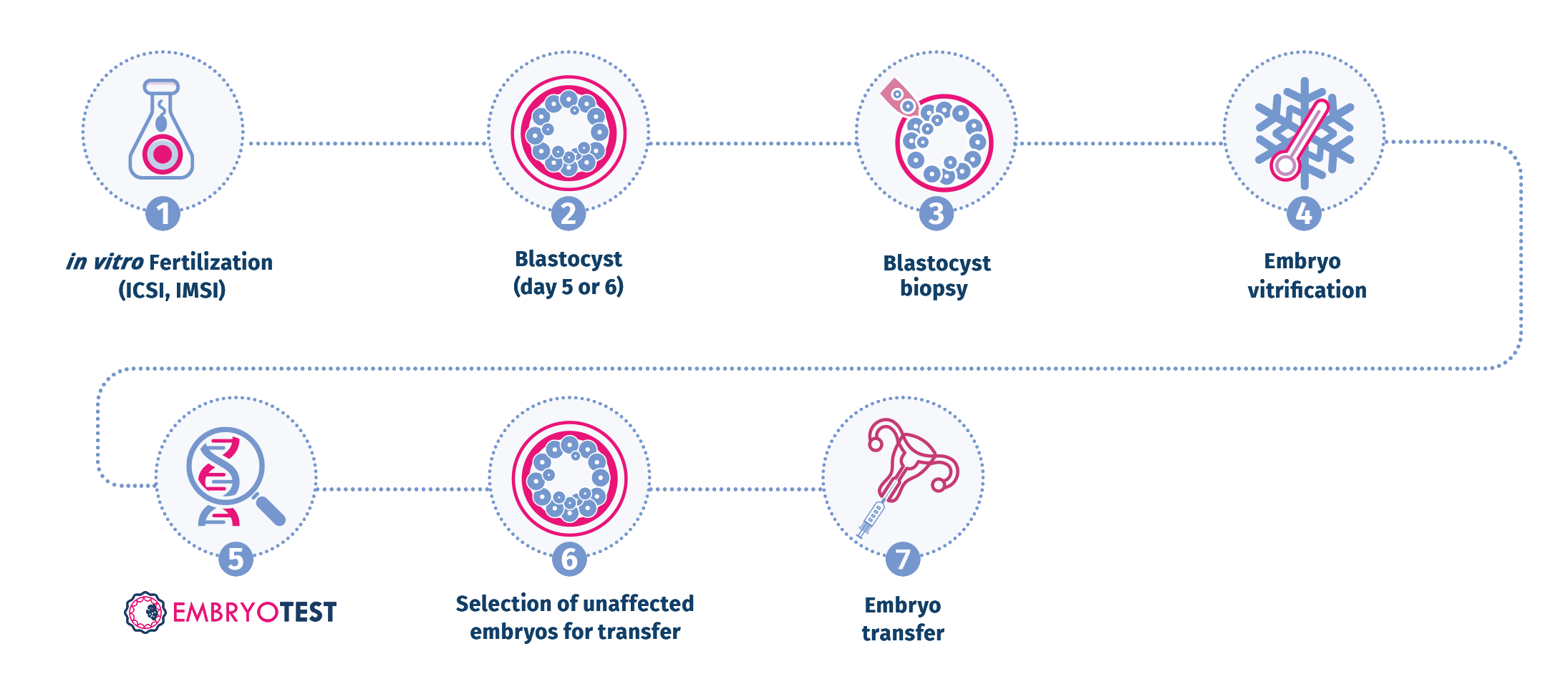
THE NEXT LEVEL IN PREIMPLANTATION GENETIC TESTING
EMBRYOTEST is the most advanced preimplantation genetic test that, using groundbreaking technologies, screens multiple genes to detect mutations causing severe inherited and de novo genetic disorders in embryos.
EMBRYOTEST
is a complement to Genomica's market-leading
![]() test, which screens embryos for aneuploidies
and segmental chromosome imbalances.
test, which screens embryos for aneuploidies
and segmental chromosome imbalances.
inherited and de novo genetic disorders in embryos

Inherited genetic disorders are caused by
mutations carried by the couple. These
mutations, detectable in the parents
with pre-conception carrier screening
tests, can be transmitted to the progeny
at conception, and therefore become
detectable in preimplantation embryos.

De novo genetic disorders are caused by mutations, named de novo (a
gene mutation that is not inherited), that arise randomly in the embryo.
These genetic diseases often occur in the absence of a family history of
the condition and cannot be detected by standard carrier screening, as
de novo mutations are not detectable in the parents. De novo genetic
disorders can cause serious conditions such as skeletal dysplasias,
congenital heart defects, multiple congenital malformation syndromes,
neurodevelopmental disorders, autism, epilepsy and/or intellectual
disability.
SCREEENING LEVELS


A CUTTING-EDGE GENETIC TEST THAT OFFERS A FULL PANEL OF SCREENING OPTIONS


EMBRYOTEST also identifies genetic diseases associated with
advanced paternal age (eg. Achondroplasia,
Pfeiffer's syndrome, Apert's syndrome, Crouzon's syndrome, Osteogenesis lmperfecta, etc.), caused by
DNA mutations that arise during the spermatogenesis process, providing couples with advanced age the
opportunity to use a more comprehensive screening test.1
EMBRYOTEST also allows identification in embryos
of genetic conditions whose incidence is independent of maternal age. Genetic diseases detectable with
this test have a cumulative incidence ~1/600, and ~1/300 for disorders determining developmental delay. 2
1. Kong A, et al.: Rate of de novo mutations and the importance of father's age to disease risk. Nature 2012, 488:471-475.
2. McRae J, et aL Prevalence and architecture of de novo mutations in developmental disorders. Nature 542. "33--438
INDICATION FOR TESTING


Couples with a family history of a genetic disease

Couple wishing to lower the risk for genetic disorders in embryos

Couples requiring gamete donation, in order to minimize the reproductive risk

Patients who are pursuing pregnancy with assisted reproductive technologies combined with PGT
THE TESTING PROCESS


EMBRYOTEST usually requires that the couple undergoes to an in vitro fertilization (IVF) treatment.
 This involves hormonal treatments that allow the collection of multiple eggs from the mother. The eggs are then fertilized using the father’s seminal fluid and the resulting embryos are transferred to an incubator.
Once they have reached the blastocyst stage
This involves hormonal treatments that allow the collection of multiple eggs from the mother. The eggs are then fertilized using the father’s seminal fluid and the resulting embryos are transferred to an incubator.
Once they have reached the blastocyst stage  embryos will be subjected to a trophectoderm biopsy
embryos will be subjected to a trophectoderm biopsy  for the recovery of the embryonic cells and subsequent cryopreservation
for the recovery of the embryonic cells and subsequent cryopreservation awaiting test results. The DNA of each embryo will then be analyzed with EMBRYOTEST
awaiting test results. The DNA of each embryo will then be analyzed with EMBRYOTEST  .The unaffected embryos
will be selected
.The unaffected embryos
will be selected  per
to be transferred to the womb.
per
to be transferred to the womb. 

EMBRYOTEST usually requires that the couple undergoes to an in vitro fertilization (IVF) treatment.
 This involves hormonal treatments that allow the collection of multiple eggs from the mother. The eggs are then fertilized using the father’s seminal fluid and the resulting embryos are transferred to an incubator.
Once they have reached the blastocyst stage
This involves hormonal treatments that allow the collection of multiple eggs from the mother. The eggs are then fertilized using the father’s seminal fluid and the resulting embryos are transferred to an incubator.
Once they have reached the blastocyst stage  embryos will be subjected to a trophectoderm biopsy
embryos will be subjected to a trophectoderm biopsy  for the recovery of the embryonic cells and subsequent cryopreservation
for the recovery of the embryonic cells and subsequent cryopreservation awaiting test results. The DNA of each embryo will then be analyzed with EMBRYOTEST
awaiting test results. The DNA of each embryo will then be analyzed with EMBRYOTEST  .The unaffected embryos
will be selected
.The unaffected embryos
will be selected  per
to be transferred to the womb
per
to be transferred to the womb
A GROUNDBREAKING TECHNOLOGY ALLOWING FOR A SCREENING TEST THAT IS REVOLUTIONARY



A groundbreaking technology coupled with an advanced bioinformatic analysis allows for detection of DNA mutation in embryos causing serious genetic disorders, providing the most comprehensive information available from a preimplantation genetic test to date. EMBRYOTESTuses a state-of-the-art technological process, named Next Generation Sequencing (NGS), carried out performing full-exon sequencing of all the genes included in the panel, which allows a more comprehensive assessment of each gene and related diseases.

A groundbreaking technology coupled with an advanced bioinformatic analysis allows for detection of DNA mutation in embryos causing serious genetic disorders, providing the most comprehensive information available from a preimplantation genetic test to date. EMBRYOTESTuses a state-of-the-art technological process, named Next Generation Sequencing (NGS), carried out performing full-exon sequencing of all the genes included in the panel, which allows a more comprehensive assessment of each gene and related diseases

TEST RESULTS


NEGATIVE
No pathogenic mutation(s) detected
test result indicates that no disease causing mutations have been detected in the
targeted genes screened. In this case, the embryo is considered to be at low risk for the
genetic diseases investigated. A low risk test result greatly reduces the chances that the
embryo is affected by a genetic disorder but it cannot guarantee a healthy baby.

POSITIVE
Pathogenic mutation(s) detected
test result indicates that one or more disease causing mutations have been detected in
the targeted genes screened. In such cases, embryo is considered to be at high risk.


NEGATIVE
No pathogenic mutation(s) detected
test result indicates that no disease causing mutations have been detected in the
targeted genes screened. In this case, the embryo is considered to be at low risk for the
genetic diseases investigated. A low risk test result greatly reduces the chances that the
embryo is affected by a genetic disorder but it cannot guarantee a healthy baby.

POSITIVE
Pathogenic mutation(s) detected
test result indicates that one or more disease causing mutations have been detected in
the targeted genes screened. In such cases, embryo is considered to be at high risk.

WHY CHOOSE


ADVANCED MOLECULAR DIAGNOSTICS SOLUTIONS USING STATE-OF-THE ART TECHNOLOGIES
GENOMICA is recognized as one of the most advanced molecular diagnostics laboratory in Europe, both for the state-of-the-art instruments and technologies, as well as for its high quality standards. With a comprehensive portfolio of over 10.000 genetic tests, GENOMICA is able to satisfy increasingly specialised requests in the field of molecular genetics, providing physicians and their patients with innovative and highly specialised diagnostic solutions for any clinical need.

Test performed in Italy
(Rome or Milan)

Over 100.000genetic tests/year

Worldwide genetic testing provider

Professionals with 20+ years in the field of genetics and molecular diagnostics

Fast TAT:
15 days

Dedicated R&D team

Laboratories with groundbreaking technologies and high quality standards

Personalized genetic counseling

International Partnerships
WHY CHOOSE


ADVANCED MOLECULAR DIAGNOSTICS SOLUTIONS USING STATE-OF-THE ART TECHNOLOGIES
GENOMICA is recognized as one of the most advanced molecular diagnostics laboratory in Europe, both for the state-of-the-art instruments and technologies, as well as for its high quality standards. With a comprehensive portfolio of over 10.000 genetic tests, GENOMICA is able to satisfy increasingly specialised requests in the field of molecular genetics, providing physicians and their patients with innovative and highly specialised diagnostic solutions for any clinical need.

Test performed in Italy
(Rome or Milan)

Over 100.000
genetic tests/year

Worldwide
genetic testing provider

Professionals with 20+ years in the field of genetics and molecular diagnostics

Fast TAT:
15 days

Dedicated
R&D team

Laboratories with groundbreaking technologies and high quality standards

Personalized genetic counseling

International
Partnerships
Information request for EmbryoTest
Fill out this form for a free consultation.
One of our professionals will contact you, free of charge and without obligation, to provide you with all the information you need.



 Italiano
Italiano English
English